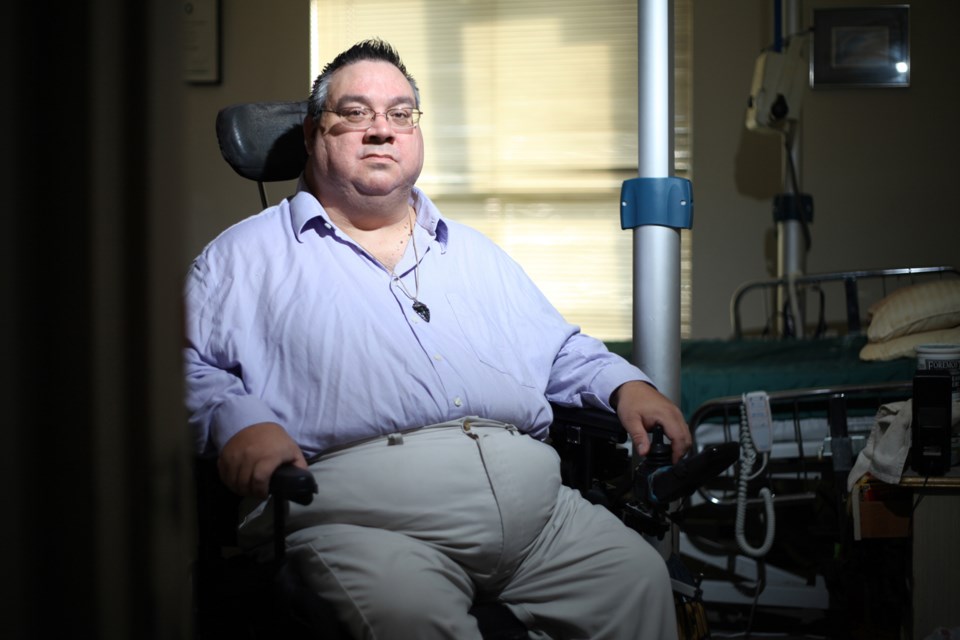Burnaby resident Craig Langston lives with cerebral palsy and has been in a wheelchair because of it for the last 10 years – drastically limiting his options on how he gets around.
He has a full-time care worker because he needs help with meal prep, bathing and getting in and out of bed – now, he says, TransLink is making life even harder with the changes to the best transportation option for him.
When it’s taken HandyDART four hours to get him to and from one medical appointment – if it shows up at all – he has to make a tough decision: either he doesn’t go or he has to struggle with conventional transit.
“I find it is frustrating to deal with it quite often,” Langston told the Burnaby NOW in a phone interview. “I find a lot of my requests for trips have been denied, and or they can’t accommodate the exact time that I would like.”
Langston said he believes the changes are a concerted effort to reduce the services across the province – between TransLink and B.C. Transit.
“I do use conventional transit, as well,” he said. “Those are the choices when trips are being denied, those are the hard choices people have to make. Do I stay home that day or do I get medical help?”
He said in some instances a HandyDART bus was more than just a few minutes late to pick him up – in some cases he waited for several hours.
“What should take an hour, at different times it turns into a four- or five- hour round-trip episode,” he said.
Langston is part of the HandyDART Riders Committee, which recently released a Coast Mountain Bus Company internal memo – obtained through a freedom of information request – showing that HandyDART trip denials have increased 670 per cent since 2008.
The report was released on Nov. 21 by its author Eric Doherty, an independent transportation planner. He said he was shocked by the data he collected. There were 37, 690 HandyDART service denials in 2012, double the number in 2011.
"I was totally shocked, and flabbergasted when I got that FOI back," he told the NOW. "I knew it was up, but I was expecting it had doubled - not up by 670 per cent."
Doherty said what the report really reveals is the transit funding crisis.
"To me, this is a key result of the lack of priority given to transit funding overall," he said. "I think it should be a key issue that people are thinking about going towards this referendum."
The report's goal is to identify the need for affordable transportation for people with disabilities, seniors and those living in poverty, according to Doherty.
"Part of the goal of this is to mobilize seniors to fight for their own services that they need, and services they may need in five years," he said. "I'm hoping that it'll also really put some attention on the need to put the resources into HandyDART, but also put resources into all the things we need to do to make an age-friendly transportation system."
In a statement released to the Burnaby NOW, Martin Lay, TransLink's director of transit services, defended HandyDART's performance.
"In 2012, HandyDART provided more trips to customers than in 2008," he said. "We are providing more rides to customers with approximately the same number of annual service hours. In 2012, only three per cent of all trips were denied."
Lang noted that up to 2009, data was not recorded as accurately as it is now, which he says is why there's an "uptick" in trip denials in 2010.
TransLink does recognize the demand for transportation services is growing, Lang said.
"It is a TransLink priority to serve all our customers, while also making best use of our limited resources," he said. "Our current sources of revenue do not allow TransLink to expand transit service."
One example of the transit authority trying to stay efficient is through using taxis for some HandyDART trips.
"Ten thousand service hours have been allocated to a HandyDART Taxi Pilot for 2013," he said. "Many of our customers experience increased service as a result of the pilot. We expect the pilot to result in 7,000 more HandyDART trips for our customers this year - these are trips that would have otherwise been denied."
But the increased use of taxis does not bring any relief to Langston's predicament of being left out in the cold, waiting for service. He tried to acquire a taxi for his Richmond hospital trip, but was denied the service.
"We're creating a society where people could be shuttered in their homes," he told the NOW. "It's a huge step back."



